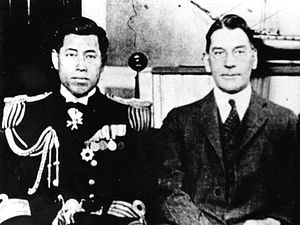So a camera crew from NHK TV, Japan, was in town this week while making a film about Admiral Isoroku Yamamoto, mastermind of the December 7, 1941 attack on Pearl Harbor. Why Newport? Because Yamamoto visited the Naval War College a time or two during the interwar years, when he traveled the United States and took measure of American society. He had history hereabouts.
A mentor of mine likes to joke about the admiral’s travels in New England. The setup: after hanging out in places like Harvard Square, Yamamoto concluded Americans were soft and irresolute, and wouldn’t fight if punched in the mouth. The punchline: wouldn’t you conclude Americans are soft after hanging out at Harvard Square?
(For you non-Bostonians out there, there was never such a wretched hive of scum and villainy as the Kremlin on the Charles. The Naval Diplomat returns as often as possible!!)
Anyway. Admiral Yamamoto’s verdict was far from unreasonable even though it ended up being wrong (as he foresaw it might be.) He famously cautioned top military leaders that the Imperial Japanese Navy could run wild for six months, maybe a year, after striking the U.S. Pacific Fleet. Taking away the battlewagons that constituted the mainstay of U.S. naval strategy would grant Japan a breathing space to consolidate its hold on the Western Pacific and China seas. After that all bets were off. A grim fate awaited Japan if Americans resolved to fight to the finish. Their nation’s advantages in natural resources and industry — the sinews of great power — would let them build up nearly insurmountable strength over time.
We tend to assume time sides with the weak. Insurgents and rebels are romantic figures, n’est-ce pas? Their adversaries are flabby and aimless, and deserve to be overthrown. I blame Mao and his military writings for popularizing such notions. World War II was one case when protracted war favored the stronger combatant. The United States merely needed time and political determination to tap its latent martial strength. It needed to finish building the two-ocean navy whose keels were laid starting in 1940. In essence a new, improved, far bigger U.S. Navy arrived in the Pacific starting in 1943. Yamamoto’s estimate of Japan’s prospects, then, proved prophetic. Indeed, the tide of war started turning at Coral Sea, Midway, and Guadalcanal in 1942-1943, about a year in.
That’s not a bad reminder of the need to size up prospective opponents accurately, appraising not just their latent and actual power but their willingness to spend that power lavishly in wartime. Sun Tzu’s maxim — know your enemy, know yourself — remains timeless. Candor about oneself and the adversary is a must.
The NHK folks were also interested in the interplay of Yamamoto’s strategy with Admiral Chester Nimitz’s. The two strategies were reciprocals in the early going, weren’t they? Think about it in boxing terms. Japan was on the strategic defensive vis-á-vis the United States throughout the war, but Yamamoto prevailed on IJN leaders to throw a preemptive tactical punch before the bell rang to start the bout. With any luck — from Tokyo’s standpoint — that sucker punch would take the fight out of the brawnier pugilist. America, on the other hand, was on the strategic offensive throughout the war but had little recourse other than to wage an active defense into 1942. Nimitz danced around, and jabbed with submarine warfare and carrier raids into the South Pacific, until enough assets arrived to let him seize the tactical offensive.
Country singer Kenny Rogers’s Gambler knew when to hold ’em, knew when to fold ’em, knew when to walk away, and knew when to run. Kenny might have been writing about Chester Nimitz in 1941-1942. Having the humility to play defense when you need to is a powerful thing. So is having the foresight to know when the time has come to transition to the offensive.
The interviewer closed with a question from downtown: do you like Admiral Yamamoto? Like him? Huh. Admiration for an enemy is one thing, affection another. I’ll probably have to enter witness protection after saying this, to protect me from my vengeful old grandmas (both wives of World War II sailors; you shoulda seen the looks on their faces when I rolled up in a Honda in college). But the answer is … yes! I do like him. Yamamoto served a bad cause, obviously, but he did so honorably and gallantly. He was a gentleman-sailor. That resonates with this son of the South, which has its own history of fighting for bad causes but whose soldiers often acquitted themselves well. Soooo … I would buy the admiral a beer were he somehow to show up in Newport again.
Now, where can I hide from Granny?

































